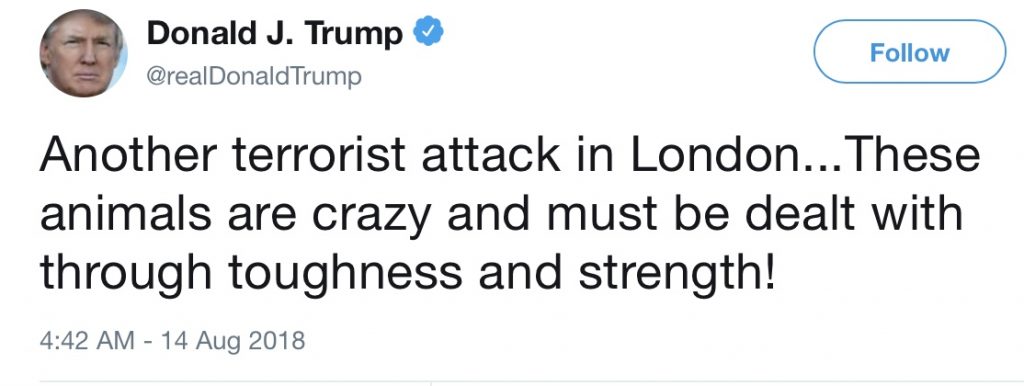
We need to change the way we talk about radicalisation
By Queenie Shillam
In the media-soaked society we live in, the way we talk about radicalisation needs to change. Society today revolves around social media, most of the information we receive comes from these social networking platforms. Media are creating a way of looking and viewing certain members of the population, as often some people believe everything they read, especially when the information we receive is written by those in power. Take the above tweet from the president of the United States, Donald Trump. In this blog I will explore the issue with media portrayal and the impact this has on these vulnerable groups. Furthermore, I will discuss what we should do to help as members of the public and how important this is.
First of all, we should define the term radicalisation, but this is no easy task. Radicalisation refers to a ‘process whose outcome is not radicalism but violent extremism’ and in society today we usually always associate radicalisation with Islamist terrorism. As according to the UK government, radicalisation is defined as ‘the process by which a person comes to support terrorism and extremist ideologies associated with terrorist groups’. Radicalisation can mean different things to different people, but this tends to lead to more problems.
The way people in power talk about radicalisation and the links they make to certain groups need to change, as this is fueling the stereotypes and creates ‘suspect communities’. This is the idea that we associate these ideas of terrorism and radicalisation with Muslim communities due to what we are told by the media. However, this is just feeding the problem, by isolating certain groups we are contributing to the radicalisation process as these members feel pushed out of society and will look elsewhere to gain a sense of community with those who they can relate to. A tweet like the one above from Donald Trump shows how he is referring to these people as ‘animals’ and the idea of using toughness and strength is what the issue is. We are creating two camps and people believe what they read and believe these stereotypes, reinforced by the media, that all Muslims are terrorists.
If the people in power are saying we should think in a certain way, their followers will agree. The power they have over issues like this are so dangerous and the consequences can be catastrophic. Of course, we need to talk about radicalisation, but we need to consider all aspects of it and take responsibility for fueling radicalisation. This is why when we discuss such a sensitive and complex topic of radicalisation, especially those in power, must take great care with the words they use. Referring to these groups as ‘animals’ and calling them ‘crazy’. This creates an image in our minds of these groups and this idea is spread amongst whole groups of people, especially when the people telling us hold great power and perceived wisdom.
When headlines in the paper blame Muslim groups and target all members of Muslim communities we see this and believe blaming them is the norm and treating these groups differently. So, if these members feel they are being constantly watched, this leads to increased chances of radicalisation in the first place.
Bearing all of this in mind, we can begin to see where the increase in radicalisation is coming from and possibly what we can do to reduce these rates. For one, we need to change our language revolving around any form of terrorist attack and the people involved, as this leads to whole groups of people being blamed and mistreated – this begins to isolate vulnerable groups. We need a united society, based on trust. We want to know the media are telling us the whole truth regarding these situations, but often the media twist these truths in order to support their point. Especially political figures ,too, by creating these suspect communities, they thrive on how people join together to blame a singular group.
In conclusion, when we discuss the concept of radicalisation we should bear in mind the consequences and implications this could have. We must be mindful of what we are saying and to whom, while being aware of what we are reading and where this comes from. In order to reduce the amount of radicalisation and the effect this has on vulnerable people.

0 Comments